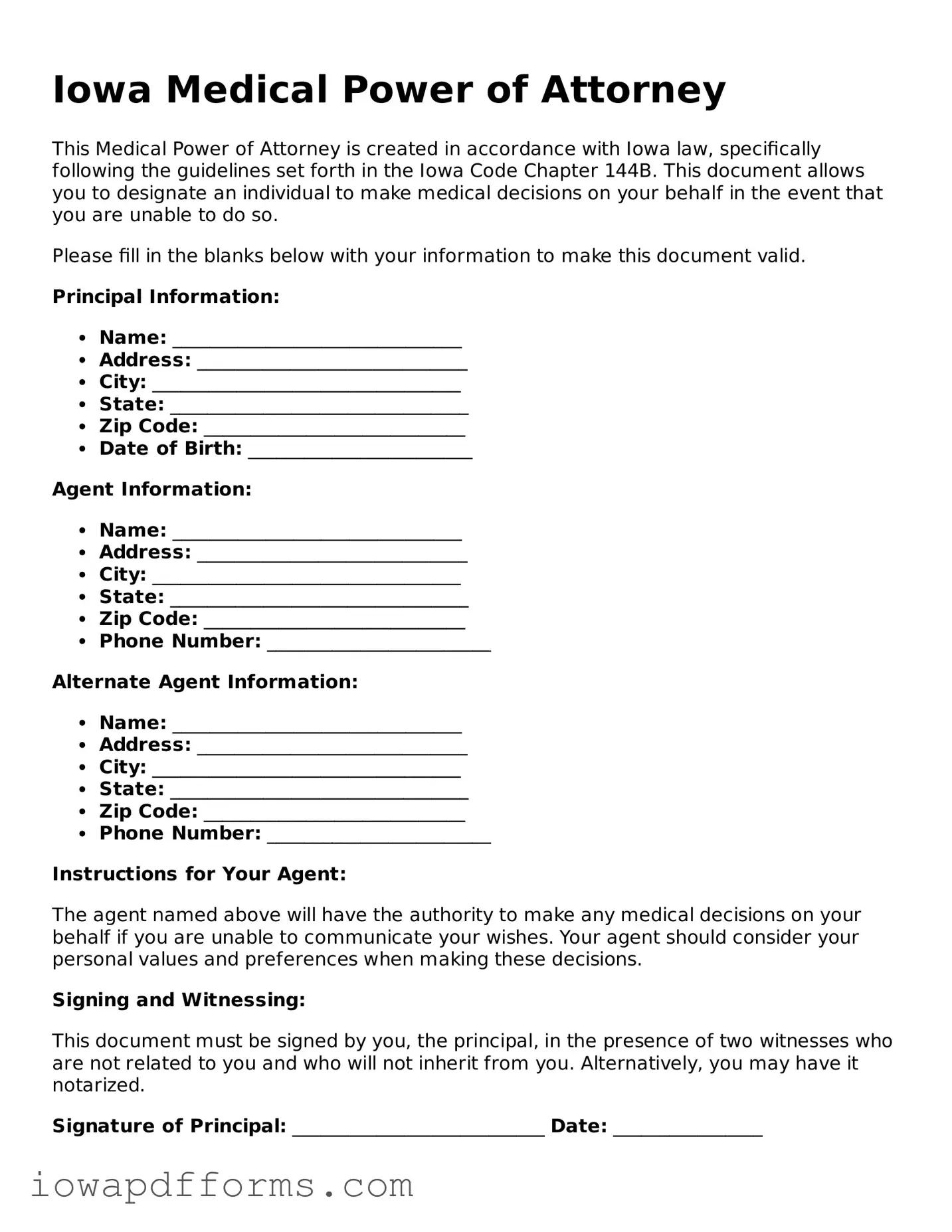The Iowa Medical Power of Attorney form shares similarities with the Durable Power of Attorney. Both documents allow individuals to appoint someone to make decisions on their behalf. However, while the Durable Power of Attorney can cover a wide range of financial and legal matters, the Medical Power of Attorney specifically focuses on health care decisions. This distinction is crucial, as it ensures that the appointed agent can act in accordance with the individual’s health care wishes when they are unable to do so themselves.
Another document similar to the Iowa Medical Power of Attorney is the Living Will. A Living Will outlines a person's preferences regarding medical treatment in situations where they cannot communicate their wishes. While the Medical Power of Attorney designates an agent to make decisions, the Living Will provides specific instructions about the types of treatment an individual does or does not want. Together, these documents work to ensure that a person's health care preferences are honored.
The Health Care Proxy is also akin to the Iowa Medical Power of Attorney. In many states, a Health Care Proxy is a legal document that allows someone to make medical decisions on behalf of another person. Like the Medical Power of Attorney, it grants authority to an appointed individual to act in the best interest of the patient. The key difference lies in the terminology and specific legal requirements that may vary from state to state.
Similar to the Medical Power of Attorney is the Advanced Health Care Directive. This document combines elements of both the Medical Power of Attorney and the Living Will. It allows individuals to appoint an agent while also detailing their medical treatment preferences. The Advanced Health Care Directive provides a comprehensive approach to health care decision-making, ensuring that both the agent's authority and the individual's wishes are clearly articulated.
The Do Not Resuscitate (DNR) order is another document that intersects with the Iowa Medical Power of Attorney. While the Medical Power of Attorney grants decision-making authority, a DNR specifically instructs health care providers not to perform CPR if a person's heart stops beating. This document is particularly relevant in end-of-life situations and complements the broader health care decisions that the Medical Power of Attorney addresses.
The Physician Orders for Life-Sustaining Treatment (POLST) form is also similar to the Iowa Medical Power of Attorney. POLST is a medical order that reflects a patient’s wishes regarding life-sustaining treatments. While the Medical Power of Attorney allows an agent to make decisions, the POLST form provides immediate medical guidance based on the patient’s preferences. It is particularly useful for individuals with serious illnesses, ensuring that their treatment preferences are respected in emergency situations.
In the realm of financial obligations, understanding the nuances of a Promissory Note is vital for both lenders and borrowers. This document solidifies the agreement to repay a specified amount under agreed terms, ensuring transparency and security throughout the transaction. For those in need of a structured financial arrangement, creating a personalized Promissory Note can be an essential step. To get started, visit https://promissoryform.com/ for an easy-to-use template that suits your needs.
The Mental Health Power of Attorney is another related document. This form allows an individual to designate someone to make mental health treatment decisions on their behalf. While the Iowa Medical Power of Attorney focuses on physical health care, the Mental Health Power of Attorney specifically addresses the unique needs of individuals facing mental health challenges, ensuring that their preferences are considered in treatment decisions.
The Revocation of Power of Attorney is also relevant in this context. This document allows individuals to revoke any previously granted powers, including those granted in a Medical Power of Attorney. It ensures that individuals maintain control over their health care decisions and can change their appointed agent if circumstances change. This flexibility is essential for adapting to new situations and ensuring that one’s wishes are always honored.
The Consent to Medical Treatment form is similar in that it allows individuals to give permission for medical procedures and treatments. While the Medical Power of Attorney designates an agent to make decisions, the Consent form is typically used for specific treatments. This document is often required by health care providers to ensure that patients or their representatives have authorized particular medical interventions.
Lastly, the Declaration of Guardian for Minor Children can be compared to the Iowa Medical Power of Attorney. Although this document primarily addresses guardianship for minors, it also allows parents to specify who should make medical decisions for their children if they are unable to do so. This ensures that, like the Medical Power of Attorney for adults, the health care preferences of minors are respected and that a trusted individual is appointed to make decisions in critical situations.

